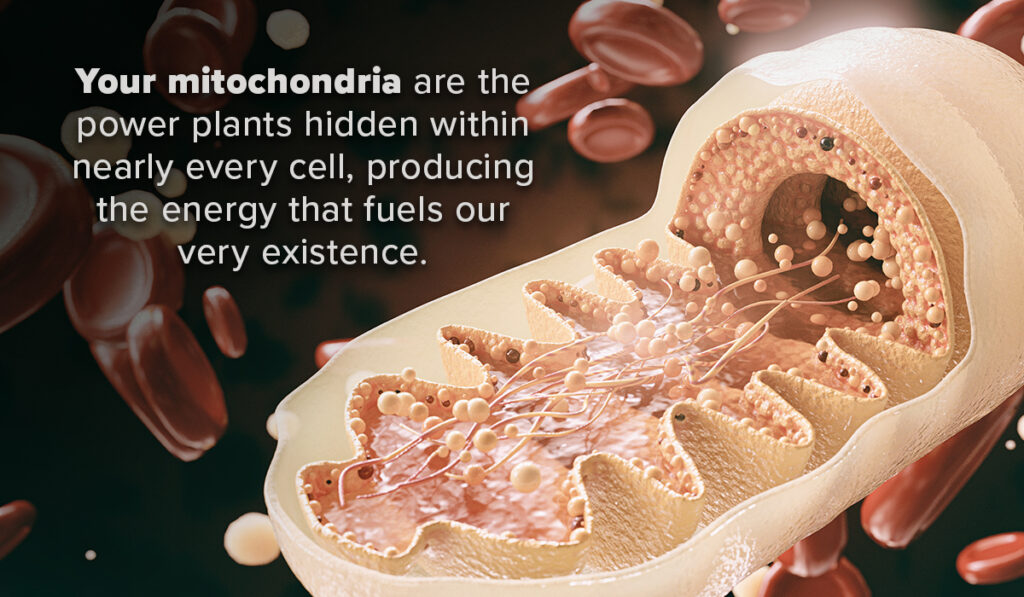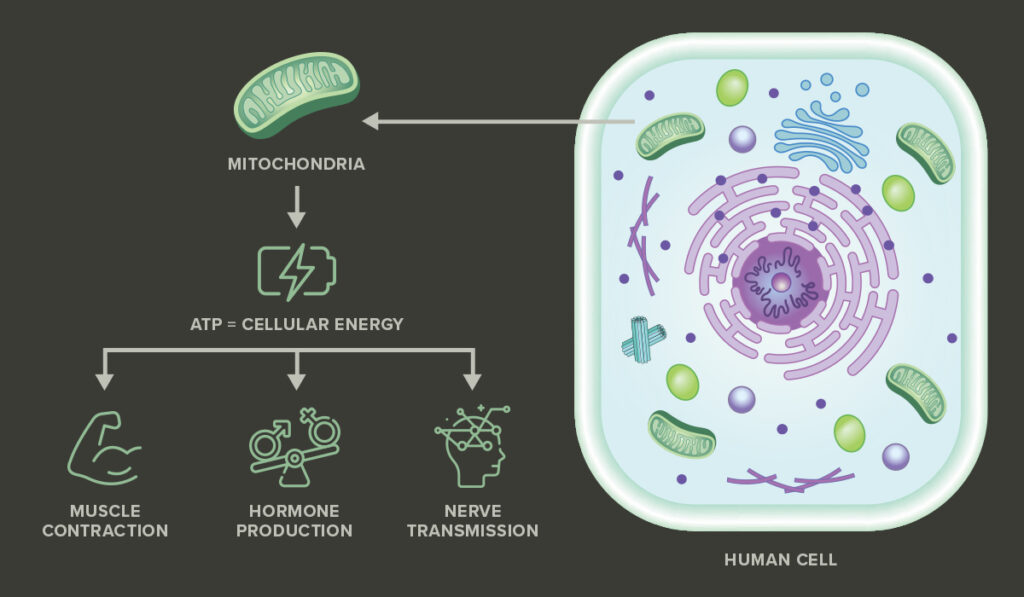Your mitochondria are the power plants hidden within nearly every cell, producing the energy that fuels our very existence. These tiny structures are pivotal to our health, vitality, and longevity. However, despite their critical role, maintaining healthy mitochondria is often overshadowed by more visible aspects of wellness. Understanding what mitochondria are, how they function, and the steps we can take to preserve and enhance their health is essential for anyone looking to boost their energy levels, slow the aging process, and fend off chronic diseases.

How do Mitochondria Fuel Your Health & Vitality?
Mitochondria are organelles within cells responsible for converting nutrients into adenosine triphosphate (ATP), the cell’s energy currency. This process supports vital cellular activities, including muscle contraction, hormone production, and nerve transmission. Many of the qualities of our youth, such as energy, drive, and rapid cognitive function, can be attributed to healthy mitochondria.

The Link Between Damaged Mitochondria, Aging, & Chronic Disease
Damaged or dysfunctional mitochondria are at the heart of many health issues, from aging to chronic diseases. Here’s why:
Autoimmunity and Inflammation: Stressed mitochondria can leak DNA fragments into cells, promoting cytokine production and autoimmunity.
Resilience to Stress: Healthy mitochondria make us more resilient to environmental stressors, including temperature changes, infections, and toxins.
Hormonal Imbalances: Mitochondrial damage is exacerbated by stress hormones like cortisol and excess estrogen, which disrupt cellular energy production.
Aging: The capacity of cells to produce energy diminishes with age, primarily due to mitochondrial damage.
Neurodegenerative Diseases: Optimizing mitochondrial health is crucial for preventing Alzheimer’s, supporting the link between mitochondrial function and brain health.
How Improving Nutrition Leads to Better Mitochondrial Function
Diet plays a crucial role in mitochondrial health. The following dietary adjustments can significantly enhance mitochondrial function:

Prioritize Quality Proteins: Amino acids from quality proteins stimulate the synthesis and repair of mitochondria.

Include more Omega-3 Fatty Acids: Good sources include grass-fed meats and wild-caught fish. Omega-3s protect brain mitochondria and reduce cognitive decline.

Use Coconut Oil: Unique compounds with coconut oil provide energy and protect mitochondria against inflammatory damage.

Rich Foods: Broccoli, cauliflower, and Brussels sprouts boost healthy mitochondria by helping to clear excess estrogen

Get Your Magnesium: Dark leafy greens and nuts are good sources of magnesium and support ATP production, protecting against oxidative damage.

Add Some Mushrooms: High in glutathione, mushrooms protect mitochondria from aging, with porcini mushrooms being particularly potent.

Intermittent Fasting: Enhance NAD+ uptake in mitochondria, boost metabolism, and increase cellular protection by waiting 12-16 hours between your last meal of the day and your first meal the following day.
Strengthen Your Mitochondria with Exercise

Physical activity not only strengthens muscles and improves cardiovascular health but also enhances mitochondrial function:
Concentric Exercise: Restores mitochondrial function, promoting cellular energy production. Pulling/dragging a weighted sled is safe and quite effective for this exercise.
Interval Training: Builds oxygen-utilizing mitochondria within muscle fibers, improving endurance and fitness. Interval training that includes exerting the muscles fast and powerfully for 10-15 seconds, followed by a short 45-second recovery, builds oxygen using mitochondria within the fast twitch fibers.
Spend some time in Zone 2: Steady-state aerobic activities for 30 minutes at approximately 60% of max heart rate, enhances mitochondrial function and aids in physical and mental recovery.
Recover and Regenerate

Rest and specific recovery methods are vital for maintaining mitochondrial health:
REM Sleep: Stimulates the multiplication of stem cells and mitochondria, crucial for repair and rejuvenation.
Red Light Therapy: Early morning sun exposure can help replace damaged mitochondria and improve their function.
Sauna Use: Increases mitochondrial function by up to 28% through oxidative phosphorylation.
To Recap
Mitochondria, though small in size, play a monumental role in our health and well-being. They are the unseen heroes of our cells, powering every action, thought, and breath. By nourishing them with key nutrients, engaging in physical activities that stimulate their function, and allowing our bodies the rest and recovery needed, we can enhance our vitality, slow the aging process, and protect against chronic diseases. Taking care of our mitochondria means moving towards the ultimate steps of self-care.
Find the nutrition you need on this week’s menu.
SHOP NOW >






